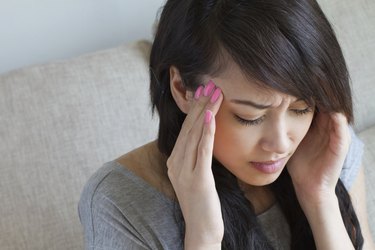
Presyncope is a feeling of lightheadedness and faintness that does not result in loss of consciousness. This dizziness is not related to vertigo or related to inner ear or neurological problems and is most often related to blood sugar levels or blood pressure. There are a wide variety of ways that diet can cause dizziness, and learning about these dietary causes can help you control these symptoms and any associated difficulties or discomfort.
Diet and Blood Sugar
Video of the Day
If you skip meals or consume less calories than you require for proper physical functioning, your blood sugar may drop below normal levels. Fatigue and dizziness are common symptoms of low blood sugar and frequently occur when people undertake extreme weight-loss diets or engage in excessive exercise. Eating a snack typically increases your blood sugar levels causing dizziness to subside. If you are experiencing regular episodes of lightheadedness due to low blood sugar levels, you may need to consult with a doctor or nutritionist about strategies to stabilize your blood sugar levels.
Video of the Day
Dehydration
If you engage in excessive exercise or consume high amounts of caffeine or alcohol, you run the risk of becoming dehydrated. As you lose body fluids, you also can experience electrolyte imbalances, leading to sensations of dizziness and lightheadedness. You can control these symptoms by consuming a minimum of 8 glasses or 64 ounces of water each day. Controlling your alcohol and caffeine intake also limits these negative physical side effects.
Food Allergies
Foods allergies can cause a variety of physical symptoms including dizziness and lightheadedness. You should consult a medical professional if you experience these symptoms in relation to a specific food. Common food allergies include peanut allergies and allergies to fruits or fish. Some individuals can experience very extreme reactions and must eliminate certain foods from their diets.
Blood Pressure and Heart Disease
Issues of high blood pressure and heart disease also can produce feelings of dizziness. A diet high in sodium and saturated fats can increase your risk for high blood pressure and high cholesterol, both of which can place increased stress on the heart. Limiting your sodium intake to less than 2,300 g per day can help reduce blood pressure and alleviate associated dizziness. Likewise, controlling your intake of saturated and trans fats by avoiding high-fat foods helps lower both blood pressure and cholesterol levels.
Is this an emergency? If you are experiencing serious medical symptoms, please see the National Library of Medicine’s list of signs you need emergency medical attention or call 911.